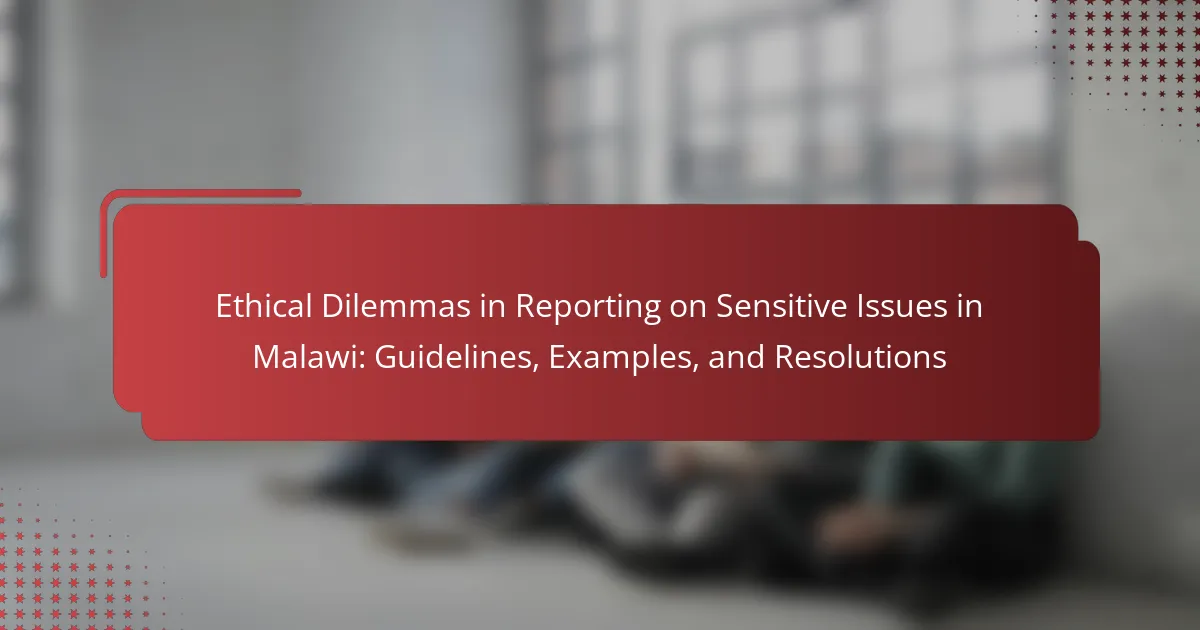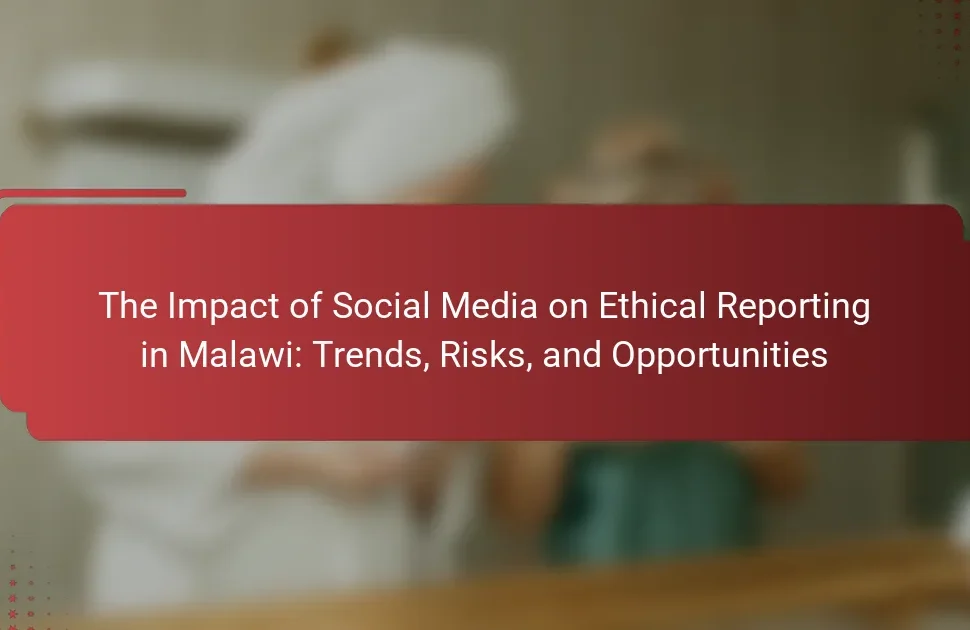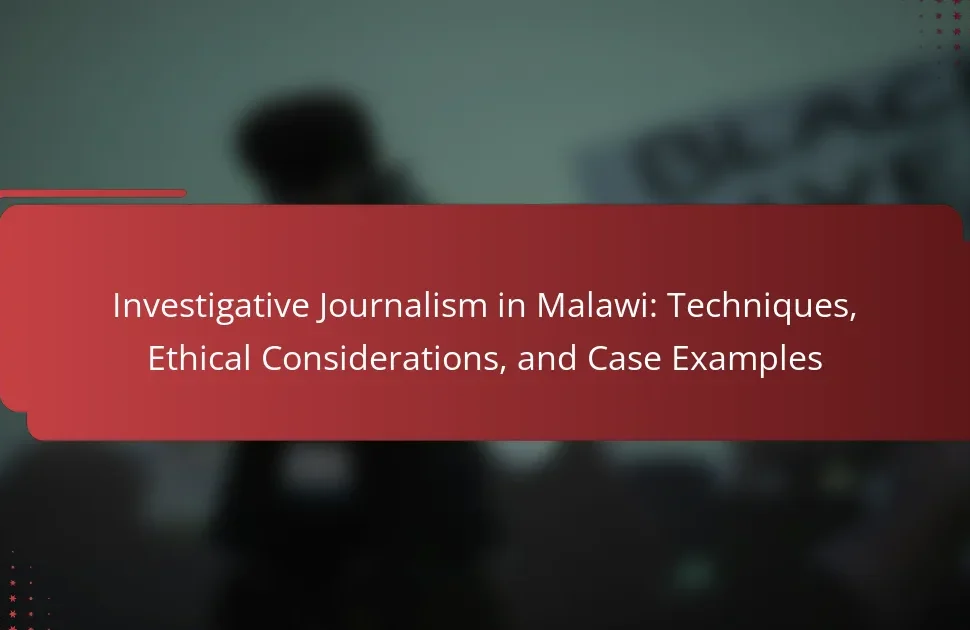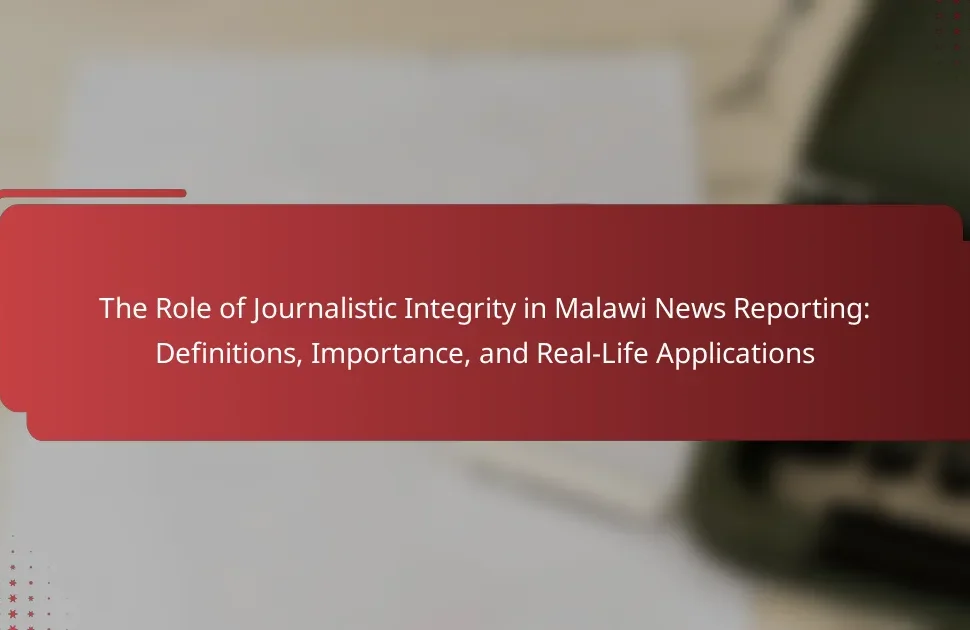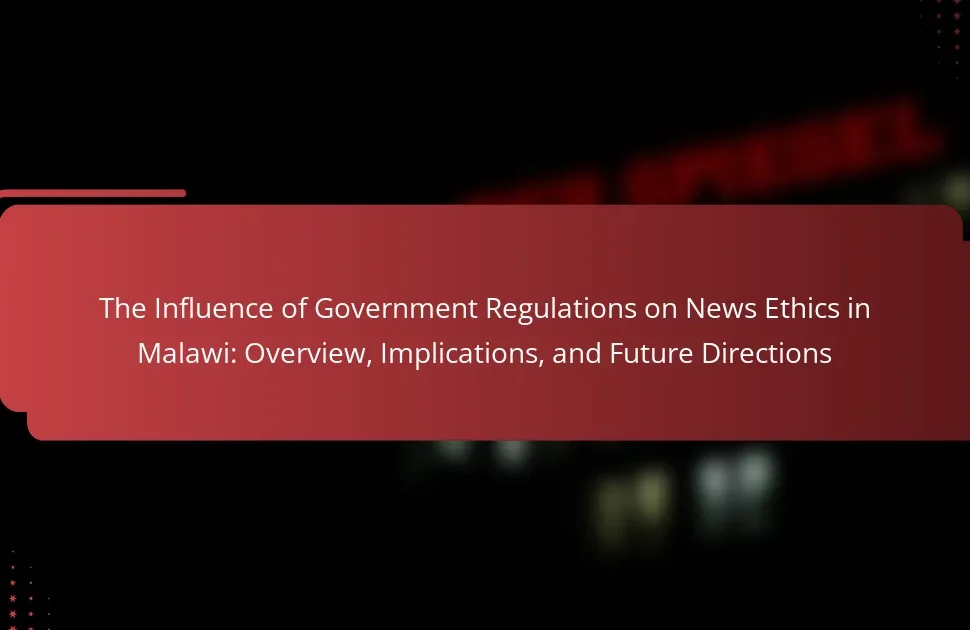The article addresses the ethical dilemmas faced by journalists in Malawi when reporting on sensitive issues. Key challenges include balancing public interest with potential harm to individuals, privacy concerns, cultural sensitivities, and the risk of misinformation. It emphasizes the importance of adhering to ethical guidelines, prioritizing accuracy, and considering the impact on affected communities. The article also highlights how ethical reporting fosters transparency, reduces misinformation, and promotes social justice, ultimately contributing to improved governance and community engagement in Malawi.
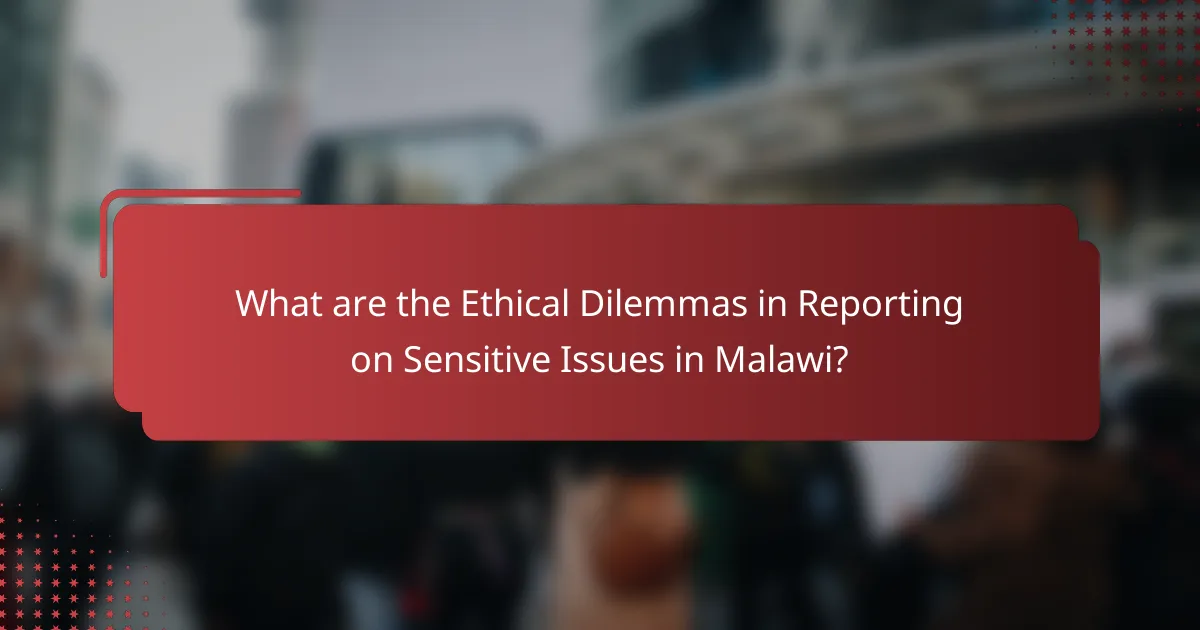
What are the Ethical Dilemmas in Reporting on Sensitive Issues in Malawi?
Reporting on sensitive issues in Malawi presents several ethical dilemmas. Journalists often face the challenge of balancing public interest with the potential harm to individuals involved. For example, reporting on health issues may expose vulnerable populations to stigma. Privacy concerns arise when disclosing personal information about victims of violence or abuse. Cultural sensitivities also play a significant role, as certain topics may conflict with local beliefs and customs. There is a risk of misinformation if journalists lack proper context or understanding of the issues. Additionally, the pressure for sensational stories can lead to irresponsible reporting. These dilemmas require careful consideration to uphold ethical standards in journalism.
Why are ethical considerations crucial in reporting sensitive issues?
Ethical considerations are crucial in reporting sensitive issues to protect individuals’ rights and dignity. They ensure that journalists do not cause harm to vulnerable populations. Ethical reporting fosters trust between the media and the community. It also upholds the integrity of the journalistic profession. For instance, the Society of Professional Journalists emphasizes the need for fairness and accuracy. Ethical guidelines help journalists navigate complex situations, especially in culturally sensitive contexts like Malawi. These considerations prevent the exploitation of individuals’ stories for sensationalism. They also promote accountability and transparency in reporting practices.
What specific challenges do journalists face in Malawi?
Journalists in Malawi face several specific challenges. These include government censorship and restrictions on press freedom. The Malawi government has been known to intimidate journalists critical of its policies. Additionally, journalists often encounter a lack of resources and funding. This financial strain limits their ability to conduct thorough investigations.
Moreover, the legal environment poses risks, with laws that can be used against journalists. For instance, the Penal Code includes provisions that can criminalize defamation. Lastly, societal pressure can lead to self-censorship among journalists. This pressure stems from cultural norms and fear of backlash from communities or authorities.
How do cultural factors influence ethical reporting in Malawi?
Cultural factors significantly influence ethical reporting in Malawi. Traditional beliefs and social norms shape journalists’ decisions on sensitive topics. Respect for elders and authority figures can lead to self-censorship in reporting. Community values often prioritize harmony over conflict, impacting the portrayal of controversial issues. The influence of religion also plays a role in framing narratives. Journalists may avoid topics that contradict religious teachings. Additionally, cultural taboos can restrict discussions on issues like gender and sexuality. These factors create a complex landscape for ethical reporting, necessitating sensitivity and awareness among journalists.
What are the key ethical guidelines for journalists in Malawi?
Key ethical guidelines for journalists in Malawi include accuracy, fairness, and accountability. Journalists must verify information before publication. They should provide balanced coverage, representing diverse viewpoints. Respect for privacy is crucial, especially in sensitive cases. Journalists must avoid conflicts of interest and disclose them if they arise. They should also refrain from sensationalism that could harm individuals or communities. Adhering to these guidelines promotes trust and integrity in journalism. These principles align with the Malawi Journalists Association’s Code of Ethics, which emphasizes responsible reporting.
How can journalists ensure accuracy and fairness in their reporting?
Journalists can ensure accuracy and fairness in their reporting by adhering to rigorous fact-checking protocols. They should verify information from multiple credible sources before publication. This includes consulting experts or primary documents related to the story. Journalists must also strive for balanced representation of all viewpoints, especially in sensitive issues. The Society of Professional Journalists emphasizes the importance of seeking truth and reporting it. Transparency about sources and methods enhances credibility. Additionally, ongoing training in ethical reporting practices contributes to improved accuracy and fairness.
What role does consent play in reporting sensitive issues?
Consent is crucial in reporting sensitive issues as it respects individuals’ autonomy and privacy. It ensures that those involved have control over their narratives. Obtaining consent can prevent further trauma for the individuals affected. Ethical guidelines emphasize the importance of informed consent in journalism. For instance, the Society of Professional Journalists states that journalists should minimize harm. This principle reinforces the need for consent when reporting on vulnerable populations. Without consent, reporting can lead to exploitation and mistrust in media. Thus, consent is foundational for ethical and responsible reporting.
What examples illustrate ethical dilemmas faced by journalists in Malawi?
Journalists in Malawi face ethical dilemmas such as balancing the right to report with the risk of harm to individuals. For instance, reporting on corruption can expose whistleblowers to retaliation. Another example is covering sensitive health issues like HIV/AIDS, where privacy concerns clash with the public’s right to know. Additionally, journalists often navigate the challenge of biased reporting amid political pressures. Cases of censorship from government officials further complicate their ethical landscape. These dilemmas illustrate the tension between journalistic integrity and societal responsibilities.
What case studies highlight conflicts between public interest and individual privacy?
Case studies that highlight conflicts between public interest and individual privacy include the Edward Snowden revelations and the Cambridge Analytica scandal. In the Snowden case, the disclosure of NSA surveillance programs raised significant public interest issues regarding national security versus individual privacy rights. The Cambridge Analytica scandal involved the unauthorized use of personal data from millions of Facebook users for political advertising, igniting debates on data privacy and consent. Both cases illustrate the tension between the need for transparency in public interest and the protection of individual privacy rights.
How have journalists navigated ethical challenges in high-profile incidents?
Journalists have navigated ethical challenges in high-profile incidents by adhering to established codes of ethics. They prioritize accuracy, fairness, and transparency in their reporting. For instance, during the 2018 Malawi elections, journalists faced pressure to report biased information. They responded by fact-checking claims and providing balanced coverage.
Additionally, journalists have sought guidance from professional organizations. The Malawi Journalists Union offers resources and training on ethical reporting. These initiatives help journalists make informed decisions in complex situations.
Moreover, journalists have engaged in public discussions about ethical standards. This fosters accountability and encourages adherence to ethical practices. By collaborating with peers, they share experiences and strategies for handling ethical dilemmas.
Overall, the commitment to ethical journalism has been crucial in maintaining public trust during high-profile incidents.
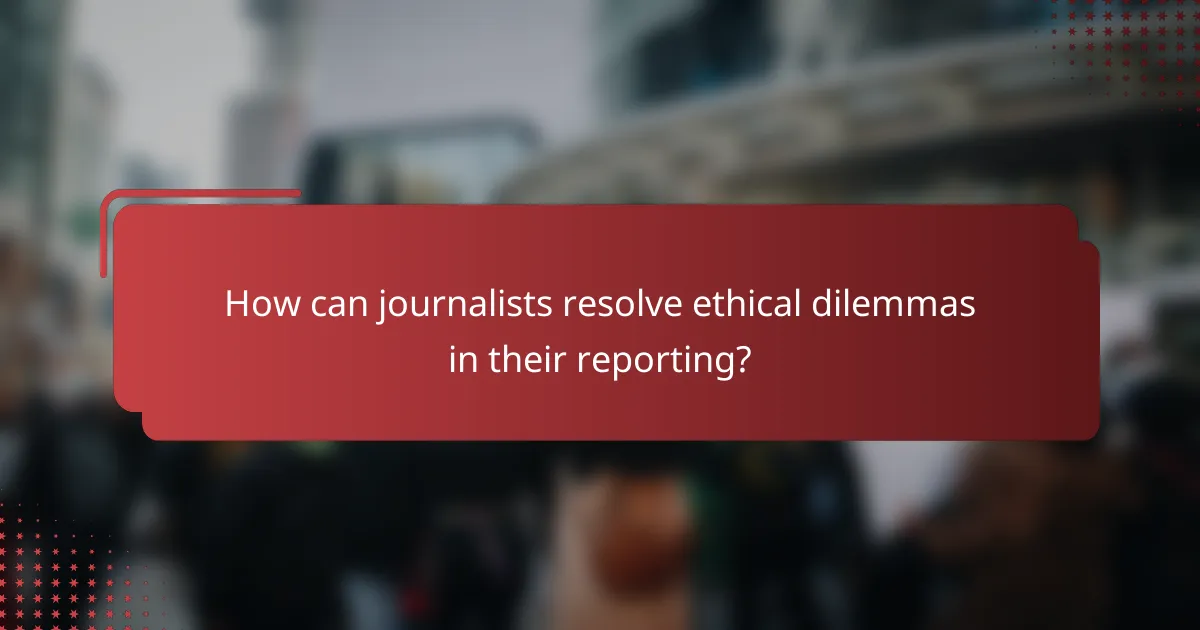
How can journalists resolve ethical dilemmas in their reporting?
Journalists can resolve ethical dilemmas in their reporting by adhering to established ethical guidelines and frameworks. They should prioritize accuracy and fairness in their work. Consulting with editorial standards and codes of ethics, such as those from the Society of Professional Journalists, can provide guidance. Engaging in discussions with colleagues can help clarify complex situations. Additionally, considering the potential impact on affected individuals and communities is crucial. Journalists should also seek transparency in their reporting processes. Reflecting on personal biases can aid in making ethical decisions. Finally, ongoing education about ethical issues in journalism is essential for maintaining integrity in reporting.
What strategies can be employed to address ethical conflicts?
Strategies to address ethical conflicts include establishing clear ethical guidelines and fostering open communication. Clear guidelines provide a framework for decision-making. Open communication allows for the discussion of differing viewpoints. Training staff on ethical standards enhances awareness. Engaging stakeholders in ethical discussions promotes diverse perspectives. Utilizing ethical decision-making models aids in resolving conflicts systematically. Regularly reviewing and revising ethical policies ensures they remain relevant. These strategies have been shown to improve ethical practices in various organizations, enhancing accountability and transparency.
How can peer support and mentorship improve ethical decision-making?
Peer support and mentorship can significantly enhance ethical decision-making by providing guidance and diverse perspectives. These relationships foster a safe space for discussing ethical dilemmas. Mentors can share their experiences, helping mentees navigate complex situations. This exchange of ideas promotes critical thinking and encourages individuals to consider the implications of their choices. Research shows that collaborative discussions lead to more informed decisions. A study by the Journal of Business Ethics highlighted that mentorship improves ethical awareness among employees. This awareness is crucial in sensitive reporting contexts, such as those in Malawi.
What resources are available for journalists facing ethical dilemmas?
Journalists facing ethical dilemmas can access several resources. Professional organizations like the Society of Professional Journalists offer ethical guidelines and support. The International Federation of Journalists provides resources tailored to various ethical challenges. Online platforms such as the Ethical Journalism Network offer case studies and best practices. Additionally, journalism schools often have ethics courses and advisory services. These resources help journalists navigate complex situations effectively.
What role do media organizations play in supporting ethical reporting?
Media organizations play a crucial role in supporting ethical reporting by establishing standards and practices that promote integrity. They create codes of ethics that guide journalists in their reporting. These codes emphasize accuracy, fairness, and accountability. Media organizations also provide training and resources for journalists to navigate ethical dilemmas. They foster an environment where ethical concerns can be discussed openly. By holding journalists accountable for their actions, media organizations reinforce ethical standards. Furthermore, they can implement editorial oversight to ensure adherence to these principles. Studies indicate that adherence to ethical guidelines enhances public trust in media. This trust is vital for the credibility of journalism, especially in sensitive contexts like Malawi.
How can editorial policies promote ethical standards in journalism?
Editorial policies can promote ethical standards in journalism by establishing clear guidelines for reporting. These policies outline expectations for accuracy, fairness, and integrity. They serve as a framework for journalists to navigate ethical dilemmas. By providing specific protocols, editorial policies help journalists make informed decisions. For instance, policies may include protocols for verifying sources and fact-checking information. This reduces the risk of misinformation and enhances credibility. Furthermore, editorial policies often emphasize the importance of transparency and accountability. They encourage journalists to disclose conflicts of interest and correct errors promptly. Research shows that news organizations with strong editorial policies report higher public trust. According to the Pew Research Center, 73% of Americans believe that accurate reporting is crucial for journalism.
What training programs are effective in enhancing ethical reporting skills?
Effective training programs for enhancing ethical reporting skills include workshops focused on journalistic integrity and ethics. Organizations like the Poynter Institute offer courses that cover ethical decision-making in reporting. The International Center for Journalists provides training on handling sensitive issues ethically. The Dart Center for Journalism and Trauma specializes in workshops addressing trauma-informed reporting. The Ethical Journalism Network offers resources and training on ethical practices in journalism. These programs emphasize real-world case studies and practical applications. They aim to equip journalists with the tools necessary to navigate ethical dilemmas. Evidence shows that participation in such programs improves journalists’ ability to make ethical choices in their work.
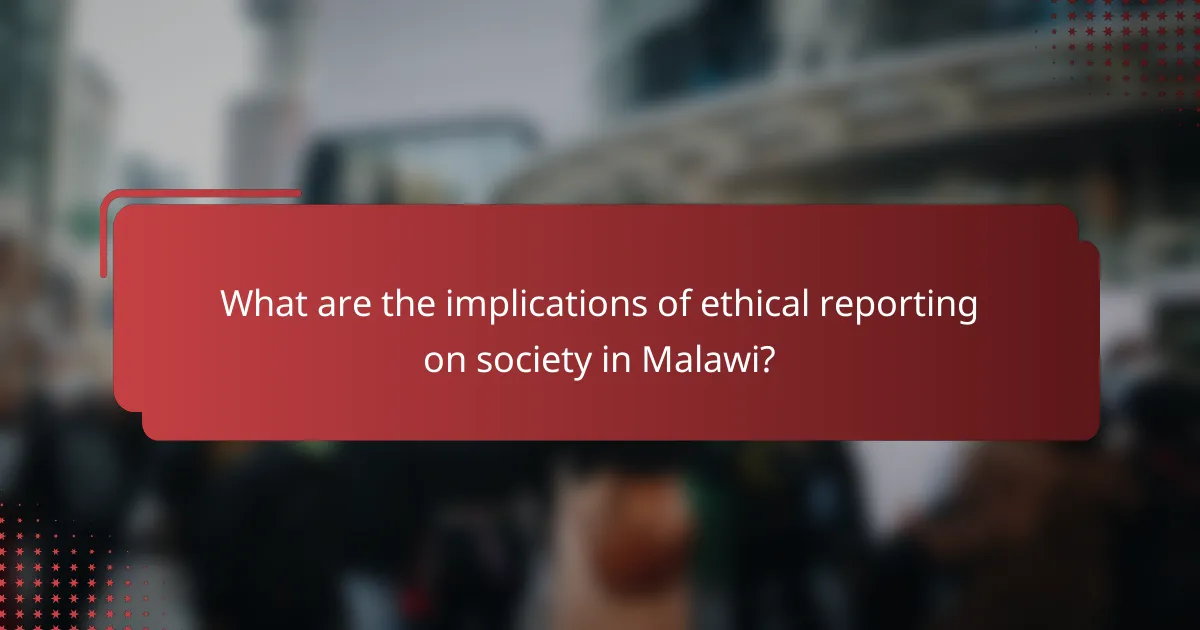
What are the implications of ethical reporting on society in Malawi?
Ethical reporting in Malawi positively impacts society by promoting transparency and accountability. It fosters trust between media and the public. Ethical practices reduce misinformation, which is crucial in a country with diverse social issues. Responsible journalism encourages informed citizenry, empowering individuals to make educated decisions. Ethical reporting also highlights marginalized voices, contributing to social justice. Studies show that ethical journalism can lead to improved governance and community engagement. For instance, the Media Institute of Southern Africa emphasizes the role of ethical reporting in enhancing democracy in Malawi.
How does ethical reporting impact public trust in the media?
Ethical reporting significantly enhances public trust in the media. When journalists adhere to ethical standards, they provide accurate, fair, and balanced information. This fosters a sense of credibility among audiences. Studies show that trust in media increases when organizations prioritize transparency and accountability. For example, a 2020 Pew Research study found that 62% of respondents expressed greater trust in media that practices ethical reporting. Ethical reporting also mitigates misinformation, which can erode public confidence. By prioritizing ethics, media outlets can build stronger relationships with their audiences.
What are the consequences of unethical reporting on vulnerable communities?
Unethical reporting on vulnerable communities leads to significant harm and perpetuates stereotypes. It can result in misinformation that misrepresents the community’s reality. This misrepresentation can exacerbate existing social stigmas. Vulnerable groups may face increased discrimination and marginalization as a result. Trust between the media and the community can erode, making future reporting more challenging. Ethical breaches can also lead to mental health issues among community members due to negative portrayals. Research shows that sensationalized reporting can trigger trauma responses in affected populations. For instance, a study by the Media Council of Malawi highlighted the detrimental effects of biased reporting on mental health in marginalized communities.
What best practices should journalists follow when reporting sensitive issues?
Journalists should prioritize accuracy and sensitivity when reporting on sensitive issues. They must verify facts before publication to ensure reliability. Maintaining confidentiality of sources is crucial, especially for vulnerable individuals. Journalists should use clear and respectful language to avoid stigmatization. They must consider the potential impact of their reporting on affected communities. Engaging with experts can provide valuable insights and context. Journalists should also be transparent about their methods and intentions. Adhering to ethical guidelines, such as those provided by the Society of Professional Journalists, is essential for responsible reporting.
How can journalists balance storytelling with ethical responsibilities?
Journalists can balance storytelling with ethical responsibilities by prioritizing accuracy and fairness. They should verify facts before publication to avoid misinformation. Ethical guidelines encourage sensitivity towards subjects, especially in vulnerable communities. Journalists must respect privacy and consent when reporting on individuals’ stories. They should also consider the potential harm that their narratives may cause. Transparency about their sources and methods builds trust with the audience. Adhering to established ethical codes, like those from the Society of Professional Journalists, provides a framework for responsible reporting. This approach fosters a balance between compelling storytelling and ethical integrity in journalism.
What tips can help journalists navigate complex ethical landscapes?
Journalists can navigate complex ethical landscapes by adhering to a clear set of principles. First, they should prioritize accuracy and verify information before publication. This is crucial in maintaining credibility. Second, they must consider the potential harm their reporting may cause to individuals or communities. Understanding the impact of their work fosters responsible journalism. Third, they should seek informed consent when interviewing vulnerable subjects. This respects the dignity and autonomy of those involved. Fourth, maintaining transparency about sources and methods is essential for accountability. This builds trust with the audience. Fifth, journalists should engage in continuous education on ethical standards and evolving issues in their field. Ongoing training helps them adapt to new challenges. Lastly, collaborating with peers for ethical discussions can provide diverse perspectives and solutions. Engaging in dialogue strengthens ethical decision-making in journalism.
Ethical Dilemmas in Reporting on Sensitive Issues in Malawi is the primary focus of this article, which examines the complex challenges journalists face when covering sensitive topics. It outlines the importance of ethical considerations, such as accuracy, fairness, and the protection of individual privacy, while also addressing the cultural influences that shape reporting practices. The article discusses specific challenges like government censorship, societal pressures, and the need for informed consent, providing guidelines and strategies for ethical decision-making. Additionally, it highlights the implications of ethical reporting on public trust and vulnerable communities, emphasizing best practices for journalists in Malawi.
